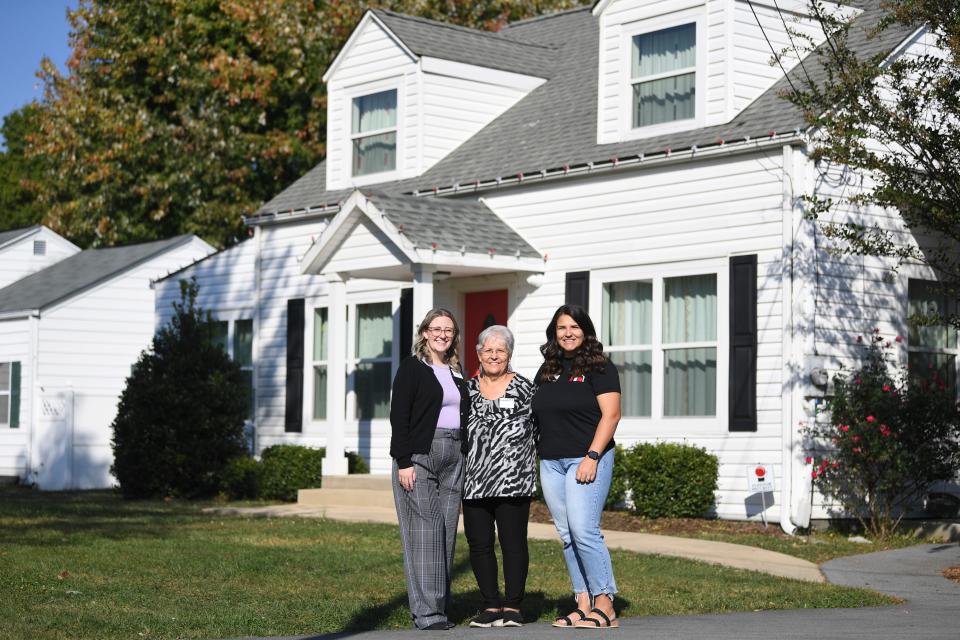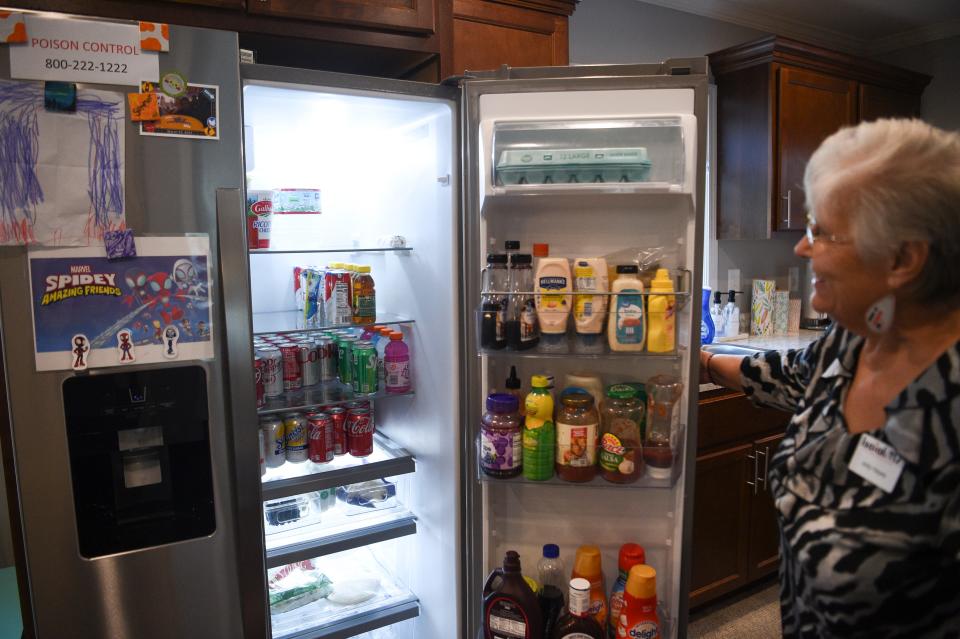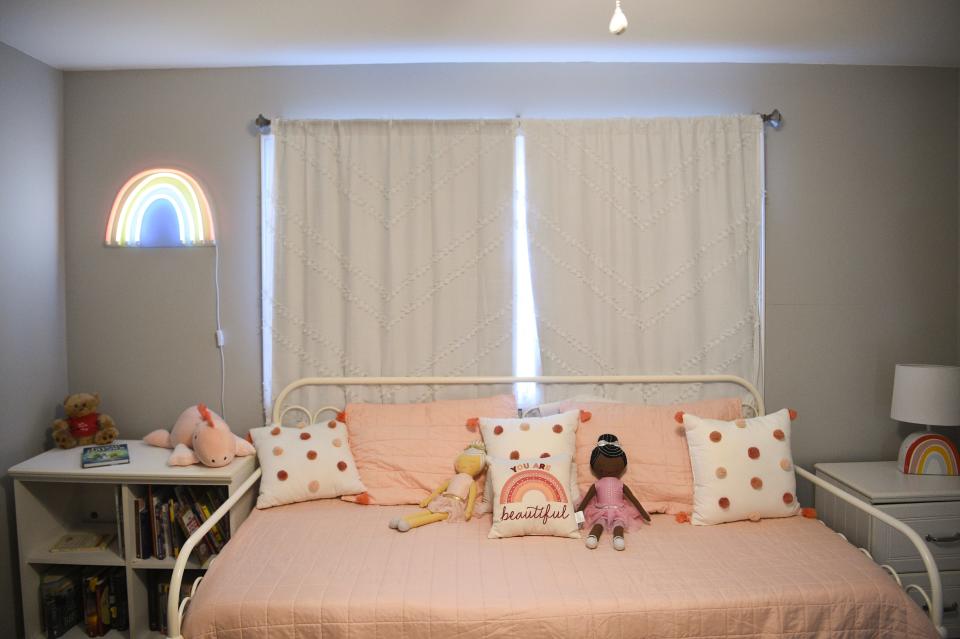How this Tennessee nonprofit found its 'calling' as DCS struggles to house kids

When Ronda Paulson became a foster mom, she was shocked to learn that many children in the state’s care were sleeping in office buildings due to a shortage of foster homes and temporary beds.
“I wanted to help in some way,” she said. “I felt a calling from God to do something.”
Paulson imagined a home where children taken into Tennessee Department of Child Services custody would have cozy beds, toys and clean clothes while they await foster placement.
With donations and help from the community, she opened that very home in 2018 on a quiet neighborhood street in her town of Elizabethton in the state’s northeast corner.
She named it Isaiah 117 House, after her first foster son Isaiah and the Bible verse that says: “Take up the cause of the fatherless.”

Five years later, Paulson, 48, is now head of a skyrocketing nonprofit with Isaiah 117 houses in 12 states, and 18 more states on the waiting list.
The organization has more than two dozen locations across Tennessee, with a home slated to open in East Nashville this year and several planned for West Tennessee, where the need is great.
What started as a modest $127,554 in total net assets in 2017 ballooned to $18.4 million in 2022, according to tax filings. Last year, over 10,000 donors gave more than $13 million.
"It's been a whirlwind," she said. "And it's all grassroots."
While Paulson's homes fill a much-needed gap in care, DCS continues to struggle with housing problems.
Tennessee’s foster care crisis has made headlines over the past year following reports that hundreds of kids taken into DCS custody were sleeping in state offices as case workers struggled to find immediate placements.
The state in March stopped housing kids in offices, and is now using faith-based organizations, like Isaiah 117, and state-run transitional homes to provide temporary beds for children awaiting placement.
In a speech last month at the Rotary Club of Nashville, DCS Commissioner Margie Quin said the agency has worked hard to "turn the ship around." But the challenges remain.

In news segment last week, two employee whistleblowers told NewsChannel 5 that DCS leaders told them to cover up reports of dangerous conditions in state-run homes, something the commissioner denies. An inspection report this summer detailed troubling conditions in a state-run home in Davidson County and DCS continues to face rounds of lawsuits over its care of children.
A major challenge
Like other states, Tennessee has struggled with a growing number of foster children and shortage of foster homes that grew worse in the pandemic.
From January 2018 to July 2022, the number of children in DCS custody jumped 7%, while the state lost about 250 foster homes during the pandemic, according to reports. The agency has about 9,000 kids in under its care.
With few options, staff placed hundreds of kids in offices, with varying accommodations. Some had beds with a private area while others had little more than chairs and a bed on the floor.
Some children stayed for just a few hours, but others that were harder to place due to behavioral or mental health issues sometimes stayed for weeks.
DCS this year shifted to state-run transitional housing and help from nonprofits to move kids into better conditions. The state is currently housing kids in 34 locations across Tennessee, with just one operated by the state and the rest run by faith groups and nonprofits where a DCS worker will stay with the child.
A July inspection report detailed alarming conditions in the state-run home in Davidson County.
The report noted a lack of consistent food for some kids, no bed linens, dirty bathrooms with graffiti, bedrooms in a "state of disarray," missed medications for one child, and hole in a wall with exposed electrical wires.
"It is recommended that immediate action be taken to reduce risk of harm to youth and to ensure steady provision of amenities located at these locations," the report noted.
The state has not taken any new inspection reports of its transitional homes since July.
DCS declined comment on the employee whistleblower allegations, but in a statement said that while it has made progress this year, more work needs to be done.
"Our staff and the onsite behavioral health specialists work to meet the needs of those youth every day. When damage or destruction occurs in the houses, work begins immediately to repair, purchase or replace," the statement read. "Commissioner Quin continues to be transparent about the challenges of placement but remains optimistic about support from community partners and the faith community that responded when the need was great."
Quin, while at the Capitol on Wednesday to present the department's 2024 budget request, denied allegations from the two whistleblowers that she had ever asked a DCS employee to delete information from internal reports or withhold certain information from DCS records.
Quin, asked about reports of severe issues with state transitional homes, including runaways, said those children are in "very difficult circumstances" and arrive in state custody with "complex trauma."
"It's a very difficult situation, but they are under the direct supervision of DCS staff and behavioral health specialists," Quin said. "You have to understand that these are kids with high acuity needs. It's a very challenging situation."
DCS is in the process of building more transitional housing, which it said will provide "more stable solutions," as part of a major real estate expansion plan with $107 million in state funding.
Paulson said the explosive growth of her nonprofit shows how the community can step up to help where the state falters.
“We have to allow children to enter our system better,” she said. “There’s so much more we can do, because we’re damaging our children in the process.”
A call to help
Paulson, a former cheer coach and anatomy professor, said she had to Google “how to start a nonprofit” when she launched Isaiah 117.
Paulson and her husband, Corey, were already parents to two teenagers when they took in their first foster child, Isaiah, in 2015 when he was 9 months old. He came to them in dirty clothes and with a roach-infested diaper bag. The couple later took in Isaiah’s 3-week-old brother Eli and officially adopted both boys in 2018.

When she started telling the stories of Isaiah and other children in need, the help poured in. A donor sold her the first Isaiah house in Carter County for a low $75,000, and she quickly had an entire year’s budget to run the home with food, gift cards and supplies.
“I never had any of these big plans for more homes, but it became pretty obvious to me that this was going to grow in Tennessee,” she said.
Paulson said all of the homes for Isaiah 117 are donated or sold to the organization for less than market value. The homes are debt free and their budgets are fully funded for up to a year before they are opened, she said.
The homes are all painted alabaster white, with black trim and a signature bright red door. Staffed largely by volunteers, the homes provided resources for more than 2,400 children last year.
Paulson said the effort has been entirely grassroots and community driven, fueled by local church and civic group drives, police and fire department donations, senior center volunteers and even money from kids running lemonade stands.
“There’s so many good, caring people that really want to help because they keep hearing about this foster care crisis,” she said. “This offers a chance for anyone of any age and any skill set to help.”
The red door
On a recent day in Elizabethton, staff were prepping the Carter County house for its next round of children.
The two-bedroom home, like all of the Isaiah houses, has an open living room floor plan so staff can see the children at all times. The closets are filled with clothes for kids of all ages, and the fridge is packed with drinks and snacks.
From the furniture to food, most everything is donated by the community.

When a child stays, the staff will work to grant nearly any request within reason, said program coordinator Mariah Sybert.
One boy cheekily asked for a 12-ounce steak from LongHorn Steakhouse and was shocked when it arrived. A teen girl who was a big fan of the house’s Keurig coffee machine was surprised to receive it as a parting gift.
“To us it seems small, but to them it makes a huge difference,” Sybert said.
Paulson now oversees an army of volunteers and staff of nearly 100. For safety, the volunteers are all state-approved and must go through a series of background checks. A DCS caseworker must stay with the child at all times while they are in an Isaiah house.
The organization does not receive any state funding, except for two grants in 2020 and 2021 for a total of $150,000, according to records.
A house will typically host a family of siblings or one or two children at a time, depending on the age and safety concerns. The guests can range in age from infants to teenagers.

Some children stay only for a few hours while others can stay for up to seven days under state rules. Though staff in Carter County said children in some cases stay longer if DCS can’t find a foster placement.
Staff said one 9-year-old boy has been with Isaiah 117 for about three months.
As for the future, Paulson said she hopes to at least have an Isaiah house in every county in Tennessee. She also hopes to see a major change for DCS, including more state funding and legislation supporting the child welfare system.
“The more houses we get, my prayer is the louder our voice gets,” she said. “And our voice will always be for the children.”
Kelly Puente can be reached at kpuente@tennessean.com or @KellyPuenteTN. Staff writer Melissa Brown contributed to this report.
This article originally appeared on Nashville Tennessean: Tennessee DCS: Isaiah 117 House works to fill child services gaps

